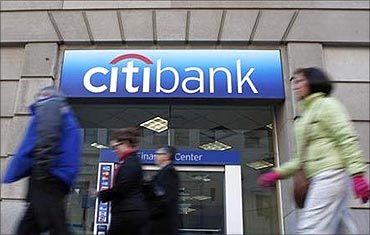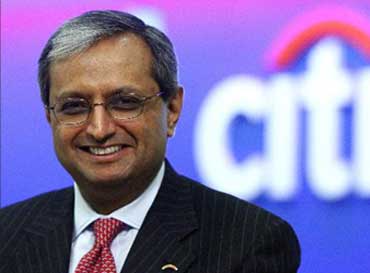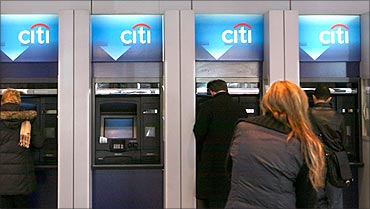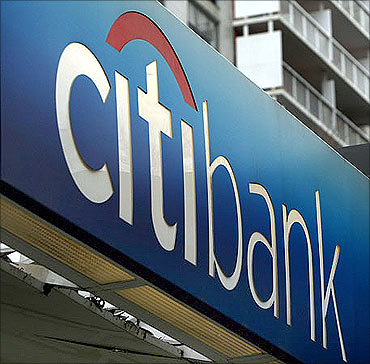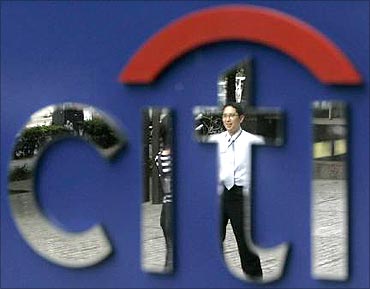 | « Back to article | Print this article |
Citi fraud: Puri played big bull, finds probe
Shivraj Puri, a Citibank manager who allegedly swindled the bank's rich clients of about Rs 300 crore (Rs 3 billion), is understood to have generated volumes of around Rs 10,000 crore in the domestic stock market in the last one year.
Both the Securities and Exchange Board of India and the Reserve Bank of India were trying to find if Puri was also involved in front-running and used his information on positions taken by Citi for placing bets, said an official with one of the regulators.
Puri generated huge volumes in the derivatives segment of the National Stock Exchange.
However, on the Bombay Stock Exchange, he did trades worth only Rs 50 lakhs (Rs 5 million), and only in the cash segment.
Click NEXT to read further. . .
Citi fraud: Puri played big bull, finds probe
One reason for this could be that BSE's derivatives segment is not very active.
Both BSE and NSE had given data to the Gurgaon police and Sebi, said top exchange officials.
Puri generated huge volumes in the derivatives segment of the National Stock Exchange. However, on the Bombay Stock Exchange, he did trades worth only Rs 50 lakhs, and only in the cash segment.
One reason for this could be that BSE's derivatives segment is not very active. Both BSE and NSE had given data to the Gurgaon police and Sebi, said top exchange officials.
Puri, who handled high networth individual accounts, is alleged to have diverted around Rs 300 crore belonging to more than 20 clients.
Click NEXT to read further. . .
Citi fraud: Puri played big bull, finds probe
He conducted most of his trades through Religare Enterprise and Bonanza Portfolio in New Delhi. Apart from his own, Puri had opened trading accounts in the name of his father and wife.
When contacted, the Bonanza director did not take the call. Without giving specific transaction details, Religare said it had given all details to the investigators.
But the question is, how did Puri generate such huge volumes?
Exchange officials said a majority of trades were in Nifty options.
To play in Nifty options, one has to pay just a premium on the strike price.
This is as low as 1-1.5 per cent of the price of the asset. So, if Puri is said to have diverted Rs 300 crore to equity derivatives, his positions were huge, said traders.
Click NEXT to read further. . .
Citi fraud: Puri played big bull, finds probe
Stock brokers say speculators mainly choose to trade Nifty options so that they do not have to take delivery and because the position can be squared off the same day.
On an average, about Rs 1 lakh crore (Rs 1 trillion) worth of equity derivatives are traded daily on NSE, of which stock and Nifty options generate 40-50 per cent of volumes.
On an average, a large stock broking firm generates a derivatives volume of Rs 5,000 crore (Rs 50 billion) in a day.
Such high liquidity makes it easy for speculators like Puri to generate huge volumes, especially in the absence of physical settlement in derivatives.
Click NEXT to read further. . .
Citi fraud: Puri played big bull, finds probe
Sebi, RBI coordinating efforts
The Securities and Exchange Board of India and the Reserve Bank of India are working in close association in investigating the Rs 300-crore Citibank fraud.
The capital markets regulator is already probing the role of brokerages in the matter.
"The co-ordination has been happening between RBI and Sebi and the regulators are working jointly to understand what went wrong," said Dr K M Abraham, a whole time member at Sebi, on the sidelines of a conference here.
"I suppose we will have a lot of lessons to learn from this (Citi fraud). There is somebody who is making investment decisions on behalf of investors."
Click NEXT to read further. . .
Citi fraud: Puri played big bull, finds probe
Last week, the Gurgaon police arrested Shivraj Puri, a Citibank relationship manager, for allegedly luring rich clients to invest in fraudulent schemes that promised high returns supposedly backed by the bank.
Abraham said the investigation capabilities of Sebi had been 'fairly sharpened'. "Investigation as a process has to adapt to the changing environment. Sebi is now in a much better position to investigate such frauds," he said, when asked whether the quantum of investigations and vigilance had gone up in the recent past.
Click NEXT to read further. . .
Citi fraud: Puri played big bull, finds probe
He, however, said the 'regulator has to learn a lot more to stay ahead of people who would perpetrate fraud'.
On a different note, Abraham said a final decision on the proposed Takeover Code will take some more time.
"It will probably take one or two more board meetings to come at a decision," he said, while refusing to give a specific timeline.
On the Bimal Jalan committee report, he said 'the regulator will take stock of the reactions that have come and eventually the board' will take a decision.
"We will need to put little more work into it," he added.
Click NEXT to read further. . .
Citi fraud: Puri played big bull, finds probe
Sebi pulls up MFs again
K N Vaidyanathan, executive director at Sebi, reiterated the need for mutual funds (MFs) to have consistent benchmarks for evaluating the performance of schemes and criticised the use of customised benchmarks in some debt schemes.
"If we have a consistent comparison to Sensex or Nifty, it would make sense to the investor," said Vaidyanathan.
He emphasised the need for differentiating between similar products on the basis of their investment strategies.
Click NEXT to read further. . .
Citi fraud: Puri played big bull, finds probe
"Let us assume one fund delivers a 17 per cent return with consistent churning and another similar fund has delivered same return by buy-hold strategy. Can this performance be conveyed to the investor," he said.
"There is no accountability on churning."
He also asked the mutual fund industry to evolve a common policy to maintain an arm's length distance from rating agencies.
"Wherever a regulatory tightening is required, the regulator will move swiftly, but fund houses should try to implement global best practices, which are good for long-term interest of the industry."
